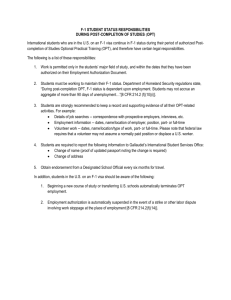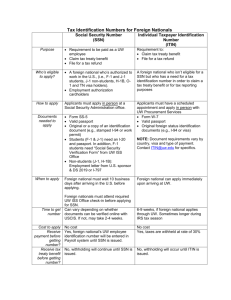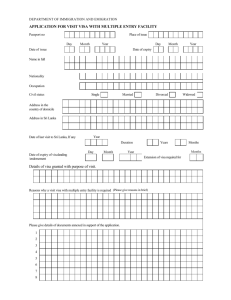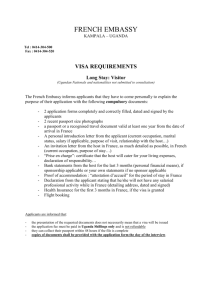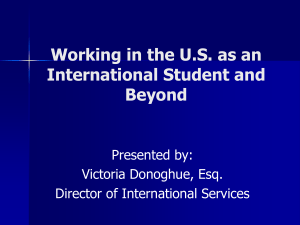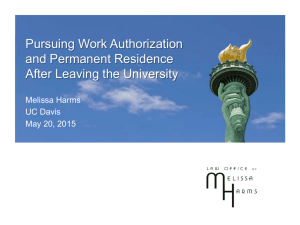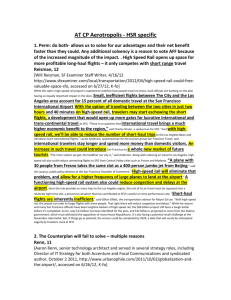GME Visa Policy - Dartmouth
advertisement
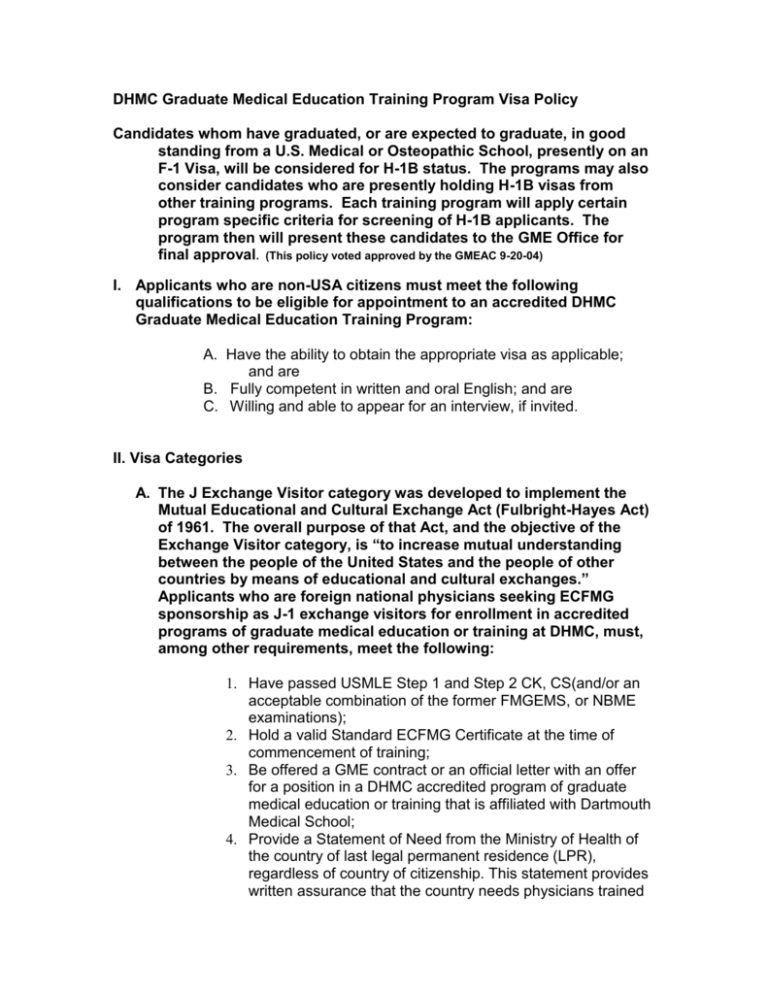
DHMC Graduate Medical Education Training Program Visa Policy Candidates whom have graduated, or are expected to graduate, in good standing from a U.S. Medical or Osteopathic School, presently on an F-1 Visa, will be considered for H-1B status. The programs may also consider candidates who are presently holding H-1B visas from other training programs. Each training program will apply certain program specific criteria for screening of H-1B applicants. The program then will present these candidates to the GME Office for final approval. (This policy voted approved by the GMEAC 9-20-04) I. Applicants who are non-USA citizens must meet the following qualifications to be eligible for appointment to an accredited DHMC Graduate Medical Education Training Program: A. Have the ability to obtain the appropriate visa as applicable; and are B. Fully competent in written and oral English; and are C. Willing and able to appear for an interview, if invited. II. Visa Categories A. The J Exchange Visitor category was developed to implement the Mutual Educational and Cultural Exchange Act (Fulbright-Hayes Act) of 1961. The overall purpose of that Act, and the objective of the Exchange Visitor category, is “to increase mutual understanding between the people of the United States and the people of other countries by means of educational and cultural exchanges.” Applicants who are foreign national physicians seeking ECFMG sponsorship as J-1 exchange visitors for enrollment in accredited programs of graduate medical education or training at DHMC, must, among other requirements, meet the following: 1. Have passed USMLE Step 1 and Step 2 CK, CS(and/or an acceptable combination of the former FMGEMS, or NBME examinations); 2. Hold a valid Standard ECFMG Certificate at the time of commencement of training; 3. Be offered a GME contract or an official letter with an offer for a position in a DHMC accredited program of graduate medical education or training that is affiliated with Dartmouth Medical School; 4. Provide a Statement of Need from the Ministry of Health of the country of last legal permanent residence (LPR), regardless of country of citizenship. This statement provides written assurance that the country needs physicians trained in the proposed specialty and/or subspecialty. It also serves to confirm the applicant physician’s commitment to return to that country upon completion of training in the United States, as required by §212(e) of the Immigration and Nationality Act, as amended and is subject to a two-year home residence requirement after completion of the training program. B. Candidates who have graduated, or are expected to graduate, in good standing from a U.S. Medical or Osteopathic school, and are presently holding an F-1 visa, may also be considered for continuing training under the F-1 visa status at DHMC. An F-1 student is a nonimmigrant who is pursuing a full course of study towards a specific educational or professional objective, at an academic institution in the United States that has been designated by the Immigration and Naturalization Service (INS) to offer courses of study to such students. The “Citizenship and Immigration Services” (CIS) may authorize students in F-1 status to engage in "optional practical training" (OPT) for up to 12 months after completion of studies, provided the appointment can be completed in 12 months. This OPT authorization is appropriate for the first or matched year, which is a 1-year contract. International Medical Graduates who receive US medical degrees while in F-1 status may apply to the CIS for OPT work authorization. If the CIS grants employment authorization, the individual may use that authorization for residency education for a period of 12 months. The F-1 "designated school official" (DSO) at the US medical school can usually provide information necessary to make employment eligibility determinations for these graduates. Pending meeting program requirements, students engaged in OPT for 12 months could be sponsored for further training under the H-1B visa status. C. The H visa category is for the temporary employment or training of foreign nationals by a specific employer. The H-1B visa allows professional foreign physicians to work in the US in specialty occupations for up to six years. Training programs will apply program specific criteria for screening of H-1B applicants who are presently holding H-1B clinical visas and transferring from other clinical training programs. There are several basic requirements physicians must meet to enter into an H-1B status to perform clinical medicine, including the following. 1. Have a license or other authorization required by the state where they will practice; 2. Have an unrestricted license to practice medicine in a foreign country or have graduated from a foreign or U.S. medical school; and 3. Have passed the appropriate examinations that include: a. Federation Licensing Examination (FLEX) parts I and II, or an ‘equivalent examination as determined by the Secretary of Health and Human Services”; b. National Board of Medical Examiners (NBME), Parts I, II and III; or c. The United States Medical Licensing Examination (USMLE), Steps 1, 2 and 3; The USMLE has become the exclusive examination for over 12 years. Passage of earlier examinations is still recognized, but “mixing and matching” parts of different examinations is not permitted for H-1B purposes. III. Programs will select applicants on the basis of preparedness, ability, aptitude, academic credentials, communication skills, and personal qualities such as motivation and integrity. Programs will not discriminate with regard to sex, sexual orientation, race, age, religion, color, national origin, disability, or veteran status. IV. All fees related to obtaining appropriate visa status including USMLE or other examinations, credentialing, licensure and or legal fees are the full responsibility of the applicant or resident or fellow. Programs must present all candidates for training to the GME Office for final approval. CD/GME/10-12-2004
